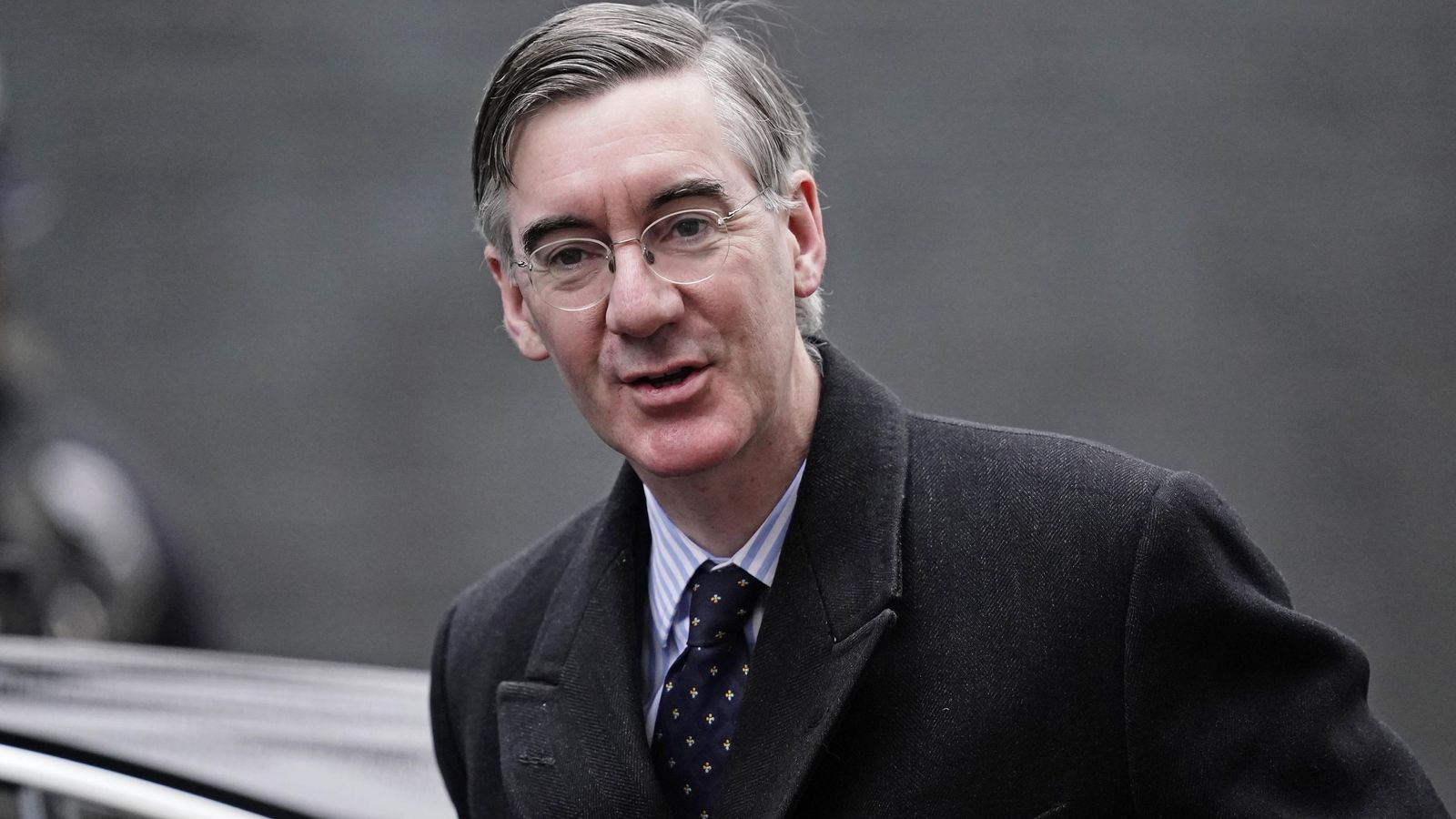Jacob Rees-Mogg has reiterated his call for civil servants to return to their Westminster offices – as Conservative chairman Oliver Dowden backed the cabinet minister’s crackdown on working from home.
Mr Rees-Mogg was this week criticised for leaving a note for civil servants, saying “sorry you were out when I visited”.
The note was left at empty desks in one government department office and read “I look forward to seeing you in the office very soon”.
The cabinet minister’s call for all civil servants to stop working from home now COVID restrictions have ended has been criticised by the FDA union which represents many civil servants.
Politics Hub: Tory chairman says removing Johnson would be ‘dearly damaging’
Its boss Dave Penman said Mr Rees-Mogg was “virtue signalling to his political base” and in doing so damaging the morale of civil servants.
Responding to criticism of his actions in a piece in the Mail on Sunday, the government minister said “parts of the public sector seems to act as if it is still in lockdown” which is a “bad deal for taxpayers”.
Minister says he’d be ‘surprised’ if there weren’t any drug users in Houses of Parliament
Could Boris Johnson face a no-confidence vote – and how would a leadership challenge work?
Owen Paterson: Jacob Rees-Mogg admits ‘mistake’ backing ex-Tory minister as government completes U-turn amid ongoing sleaze row
Speaking about the original note, Mr Penman told Sky News: “That a minister would think it appropriate to leave such crass, demeaning notes for civil servants is testament to just how disconnected Jacob Rees-Mogg is from the business of government.
“With every pronouncement and display like this, he demonstrates that he has no clue how the modern workplace operates and cares little about the effective delivery of vital public services.
“Instead, he’s intent on virtue signalling to his political base, and is either oblivious to or simply doesn’t care about the damage he’s doing to the morale of civil servants and the reputation of the civil service as an employer.”
Mr Penman added: “Ministers should care about what is being delivered by the civil service, not where someone sits at a particular point in the day.
“It’s time Rees-Mogg’s cabinet colleagues stood up for the staff in their departments and ended the harmful culture war that’s being waged on the very people tasked with delivering the government’s agenda.”
Labour’s deputy leader, Angela Rayner, tweeted: “Hasn’t Jacob Rees-Mogg got more important thing to be doing than pottering around leaving creepy notes for public servants? We’re not in the 18th Century now.”
Read more:
Rees-Mogg refuses to apologise for calling partygate scandal ‘fluff’
Rees-Mogg made minister for Brexit opportunities
Sky News understands Mr Rees-Mogg’s department, the Cabinet Office, was completely empty when he left the notes.
Defending his actions in the Mail on Sunday, the government minister said: “This is a bad deal for taxpayers as expensive property which could be given up lies empty – and a London weighting is paid to people who are not working in London and are claiming they do not need to be in London.
“Instead of being able to pop into someone’s office for a quick word, it has added an extra layer of bureaucracy.
“Every interaction has to be ‘diarised’, internet connections repaired and callers taken off mute. The informal chat has all but disappeared.”
Conservative Party chairman Mr Dowden endorsed Mr Rees-Mogg’s views on cracking down on the work from home culture.
Speaking to Sky News’ Ridge on Sunday programme, Mr Dowden said: “Jacob’s efforts are driven by getting the very best value for taxpayers and I support him in doing that.”
Earlier this week, Mr Rees-Mogg also sent ministers a league table showing which departments had been sending staff into the office most, with the Department of Trade and Industry (DTI) at the top, and the Department for Education at the bottom.
The league table showed how many employees from each department were going into the office on an average day during the week beginning 4 April.
At the Department for Education, 25% were going in, on average, while the rest worked remotely, with the Department for Work and Pensions at 27% and the Foreign Office at 31%.
The DTI had 73% in the office, followed by the Department of Health at 72%, and Mr Rees-Mogg’s department, the Cabinet Office, at 69%.






















